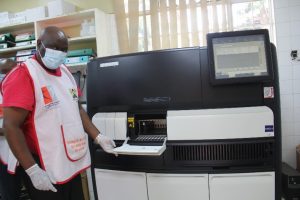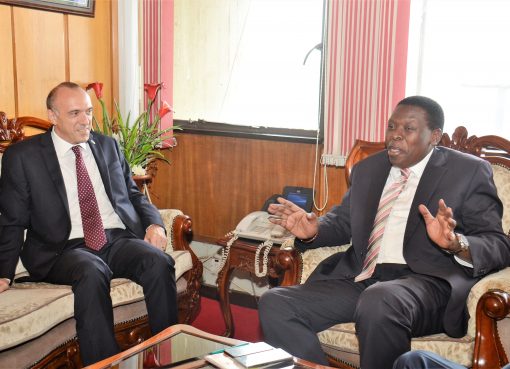When the Media Council of Kenya in partnership with Kenya National Blood Transfusion Service (KNBTS) invited me to a breakfast meeting, I didn’t immediately grasp the importance of the mission.
On the material day, I reluctantly rose earlier than usual to be in time for the 7am meeting, more out of curiosity and a sense of duty, because as per the email, I was invited ‘on behalf of my media organisation.’
At the risk of sounding ignorant, I must admit, I was not prepared for the lifesaving information my fellow editors and I received during the forum and later during a two-day sensitization follow-up.

As a matter of fact, had I known beforehand what I learnt from the meeting, I could have been a regular blood donor, which is where I want to take you, with this write-up.
Available statistics from Kenya National Bureau of Statistics (KNBS) 2020, indicate that about 60 per cent of the Kenyan population is aged between 15-64 years. Age eligibility for blood donation is 16-65 years.
Moreover, according to KNBTS, a whopping 48.25 per cent of Kenya’s population carry blood group O negative, a group categorised as universal donors, yet people are dying in hospitals for lack of blood or due to blood transfusion dependent conditions like sickle-cell anaemia as well as ulcerative colitis, a chronic inflammatory disease that affects the digestive system for lack of blood.
Of the four main blood types namely A, B, AB and O, (all of which could be either RhD positive or negative) the latter is the most predominant, universally. This may have been God’s way of ensuring that there was enough blood in circulation, in times of need.
KNBTS Head of Partnerships and County Support Mr. Chepkok Kiprono says the World Health Organisation (WHO) projects that one per cent of the population will require blood at one time or another in their lives.
That would translate to about 500, 000 pints of blood for Kenya’s 50 million people, yet currently the country only hopes to reach 400, 000 by the end of this year, up from the 280, 000 pints realised last year. Low as it may seem, it was the highest amount of blood collected since independence and a total of 282, 906 people benefitted from the donation.
Consequently, if this touches you and you would wish to help realise this target by donating blood and are wondering whether you are eligible for it, here is the check list: weigh over 50kgs, be in the age bracket of 16-65 years, have a Haemoglobin (HB) concentration of 12.5gm per decilitre and a normal blood pressure of 130/90.
However, for the female gender, please note that you should not be breastfeeding or pregnant.
At the same time, even with these optimal parameters, you will have to go through a physical examination, must not be suffering from lung or heart condition and should not be on non-medical drugs like marijuana or cocaine.
By the way, did you know that red blood cells die in your body after every hundred days? Now that you know, please donate your blood to save a life instead of leaving it to expire in your system.
The opportunities for doing so are many, with men being encouraged to donate blood four times and women three times per year.
But human nature loves to ask, what’s in it for me? When one donates blood for the first time, they get to know their blood group free of charge (if they didn’t know already) and are issued with a blood donor card which they are expected to always carry with them alongside their ID.
Carrying the donor’s card may save your life should you require blood transfusion in an emergency as it would save you the precious time you would need for testing to determine your blood type.
KNBTS Nakuru Regional Manager Irene Orgut particularly pleads with young husbands to mobilise for blood donation saying: “Your new born baby may require exchange blood transfusion at birth in case of rhesus incompatibility or your wife may go for elective surgery (uncompelled Caesarean Section (CS)) to avoid the pain associated with normal childbirth.”
Ms Orgut however urges young women to ‘push the baby’ (have normal delivery), as opposed to voluntary CS saying it not only strains the blood bank, but could deny an emergency case the much needed blood.
She explains that though not all surgery cases require blood transfusion, blood has to be held in theatre for the duration of the surgery for immediate use should the need arise. During such an operation, an accident victim could be dying at the hospital casualty.
According to Kiambu County Blood Transfusion Officer, Susan Wairegi, when a person donates blood regularly, their bone marrow is activated to produce new vital cells giving their bodies time to replenish vibrant cells and this slows down their aging process (who doesn’t love being told they look younger!).
The menstrual cycles too, help women get rid of dead cells and when they add regular blood donation to the routine, this relieves stress on the kidney, liver and spleen.
Kenya’s top blood donor, Kennedy A. Sanya, concurs it is healthy to donate blood. Sanya, who has donated blood for a record 98 times so far, attributes his good health to regular blood donation saying in his 50plus years, he has only been admitted in hospital just once, over malaria.
He feels it’s a blessing to save a life and wishes the President could talk about it and donate blood publicly to inspire other Kenyans to come forward.
When you donate blood, you also enjoy the extra benefit of getting a myriad of blood tests for free as well as obtain valuable information on health matters.
According to KNTBS, it is during blood screening that a lot of Kenyans have had a chance to learn of life-threatening health conditions. Blood is screened for HIV, Hepatitis B and C and syphilis with the last two occurring rarely.
KNBTS then contacts the donors when their blood is found to have malignant traces and refers them for appropriate intervention. Since it is well known that most health conditions are treatable if discovered early, why not become a regular blood donor and get your blood screened for free, save a live and should the need arise, get timely intervention.
One such intervention happened to a couple that was initially quite unhappy with KNTBS for ‘insisting’ they had syphilis, a deadly sexually transmitted disease that if not treated early, could lead to loss of pregnancies and mental illness in its later stage!
The couple, John and Agnes (not their real names) did not have children as Agnes kept losing her pregnancies. When John was called back after a blood donation episode to be told that he had tested positive for syphilis, he confronted the KNBTS staff accusing them of casting aspersion on his character, yet he was a faithfully married man who came to donate blood, on his own volition.
After counselling amid protests, he went home in a huff but later shared the news with the wife and encouraged her to go for testing for the disease, albeit after time healed the hurt.
Agnes too tested positive for syphilis and the STD was found to have been responsible for her miscarriages. The couple went through treatment and when Agnes was able to conceive and carry the pregnancy to term, they went back to apologise and appreciate the KNBTS staff that discovered the unfortunate infection, possibly when they experienced the joy of holding their first baby.
Lastly, KNBTS has a system of linking the blood beneficiary with the donor so you get first hand confirmation that your blood indeed saved a life. Your one pint of blood could save as many as four lives.
And that’s the overriding joy that should propel all of us to make a difference by being regular and voluntary blood donors.
By Mary Musasia





